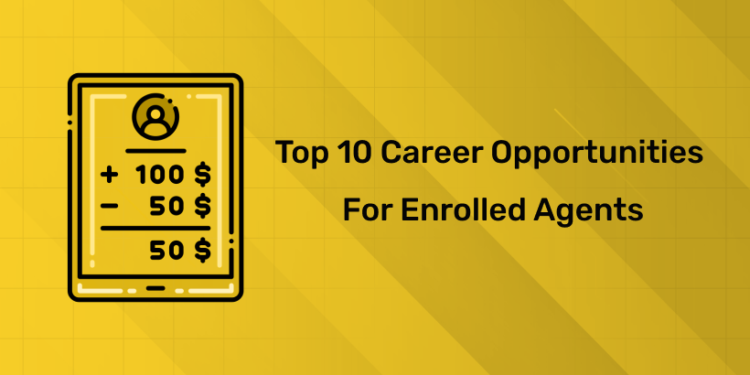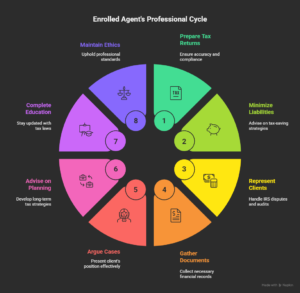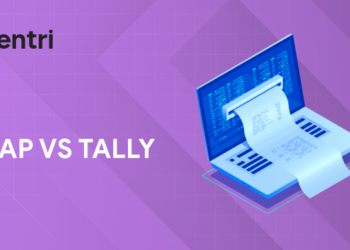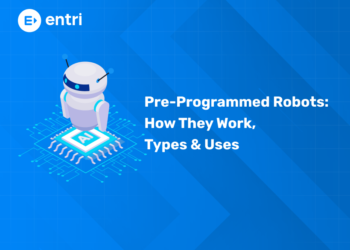Table of Contents
Introduction
Imagine facing a complex tax audit without expert help. Stress builds as deadlines loom. Enrolled Agents step in to solve these problems. They offer vital support in the tax world. This post explores top careers for Enrolled Agents. Readers will discover paths to success and growth. Tax rules change often. Demand for skilled pros stays high. Enrolled Agents hold a key IRS credential. It opens doors to rewarding jobs. Stay engaged to learn how this role leads to stable income and global chances. Each section builds on the last. Find out why now is the time to pursue this field.
Enrolled Agents represent taxpayers before the IRS. They handle audits, appeals, and collections. Their expertise covers all tax matters. Unlike others, they focus solely on taxes. This makes them essential in finance. Jobs range from private practice to corporate roles. Salaries attract many seekers. Global demand adds appeal. Steps to become one are clear. Key points wrap up the value. The end ties it all together. Keep reading for details that inspire action.
What Does an Enrolled Agent Do?
1: Accounting provides information on
Enrolled Agents prepare tax returns for individuals and businesses. They ensure accuracy and compliance with laws. Clients rely on them to minimize liabilities. They also represent clients in IRS disputes. This includes audits and negotiations. They gather documents and argue cases. Their knowledge spans federal tax codes. They advise on planning strategies. This helps clients save money long-term. Enrolled Agents must pass a tough exam. Or gain IRS experience. They complete ongoing education each year. This keeps skills sharp. They work in offices or remotely. Some own firms. Others join teams. Their role demands attention to detail. Ethics guide their actions. They protect client interests. This builds trust and repeat business. In short, they navigate tax complexities for others.
Enrolled Agents differ from CPAs or attorneys. They specialize in taxes only. This focus gives them an edge. They handle any taxpayer type. From small firms to large corps. They file returns and resolve issues. Their unlimited representation rights set them apart. Clients face fewer worries with their help. Enrolled Agents spot deductions others miss. They prevent costly errors. Their work impacts financial health. Many find satisfaction in solving puzzles. Tax season brings busy days. Off-season allows planning. This balance appeals to many. The role suits analytical minds. It requires strong communication too. Explaining rules clearly matters. Enrolled Agents build lasting client bonds. Their expertise commands respect. This credential boosts careers fast.
Placement Oriented PWC Business Accounting Course
PWC Certified Business Accounting Course by Entri App: Master in-demand skills, ace interviews, and secure top-tier jobs.
Join Now!Top Career Opportunities for Enrolled Agents
Enrolled Agents enjoy diverse job options. Here are ten top paths. Each offers unique benefits. Demand grows as tax needs rise.
- Tax Preparer in a Firm. Enrolled Agents handle client returns daily. They use software for efficiency. Accuracy prevents penalties. Firms value their IRS knowledge. This role builds experience quick. Many start here. It leads to promotions. Client interactions hone skills. Busy seasons test endurance. Rewards come from satisfied clients. Firms offer training. This path suits detail-oriented people.
- Tax Consultant for Businesses. Enrolled Agents advise companies on strategies. They reduce tax burdens legally. Planning saves firms money. Consultants review finances often. They suggest improvements. This role demands deep code knowledge. Businesses seek their input. Travel may occur. Networking opens doors. Success stories show high earnings. Consultants enjoy variety. Each client differs.
- IRS Representation Specialist. Enrolled Agents defend clients in audits. They negotiate settlements. This work resolves disputes. Skills in advocacy shine here. Clients feel relief. Specialists charge premium fees. Independence appeals to many. Remote options exist. Case wins build reputation. This path offers excitement. Challenges keep it fresh.
- Senior Tax Accountant. Enrolled Agents oversee teams in accounting. They manage complex filings. Leadership roles pay well. Experience leads to this spot. Accountants analyze trends. They forecast tax impacts. Firms promote from within. Mentorship adds value. This career provides stability.
- Corporate Tax Manager. Enrolled Agents guide company tax departments. They ensure compliance across states. Managers handle big budgets. Strategy drives decisions. Corps offer perks like bonuses. This role suits ambitious types. Growth comes fast.
- Forensic Tax Investigator. Enrolled Agents probe fraud cases. They work with law enforcement. Evidence gathering is key. Courts use their findings. This niche demands precision. Pay reflects expertise. Cases vary widely. Thrill seekers thrive here.
- Financial Planner with Tax Focus. Enrolled Agents integrate taxes into plans. They help clients build wealth. Advice covers investments too. Planners earn commissions. Client trust grows over time. This path combines skills.
- Tax Educator or Trainer. Enrolled Agents teach courses on taxes. They train new pros. Schools and firms hire them. Sharing knowledge satisfies. Flexible hours appeal. Public speaking builds confidence.
- Freelance Enrolled Agent. Enrolled Agents run solo practices. They choose clients freely. Flexibility defines this life. Home offices cut costs. Marketing grows business. Independence rewards hard work.
- Government Tax Advisor. Enrolled Agents consult for agencies. They shape policy. Stability comes with benefits. Public service motivates. Pensions add security.
Also read: Top Companies Hiring Enrolled Agents in India
These paths show versatility. Enrolled Agents adapt easily. Each offers growth potential. Choose based on strengths. Success follows dedication.
Expand on each for depth. Tax preparers deal with forms like 1040. They check deductions. Errors cost clients. Firms provide tools. Consultants meet execs. They model scenarios. Savings impress bosses. Representation involves letters to IRS. Wins save thousands. Senior accountants review work. They train juniors. Managers lead meetings. They report to CFOs. Forensic roles need certifications. Planners use software. Educators create materials. Freelancers network online. Government jobs require clearance. All paths demand ethics. Clients expect honesty. Enrolled Agents deliver results. Their credential stands out. Employers seek them. Job security follows.
More details enrich understanding. Tax preparers handle extensions. They file electronically. Consultants advise on mergers. They cut acquisition costs. Specialists prepare offers in compromise. They reduce debts. Accountants use GAAP rules. Managers oversee audits. Investigators testify in court. Planners recommend IRAs. Trainers update on law changes. Freelancers set fees. Advisors influence legislation. Variety keeps work engaging. Enrolled Agents excel in all.
Salary Insights & Career Growth
Enrolled Agents earn solid pay. Average salary hits $72,000 yearly. Entry-level starts at $42,000. Experience boosts it to $100,000 plus. Top earners reach $126,000. Location affects amounts. Big cities pay more. Skills add value. Specialties like international tax increase earnings. Bonuses come with performance. Firms offer raises yearly.
Growth paths lead up. Start as preparer. Move to manager. Own a firm later. Certifications help. Networking opens jobs. Demand rises with tax changes. Jobs grow 6% yearly. Remote work expands options. Freelancers set rates high. Success stories show quick climbs. One EA built a practice fast. Earnings reflect effort. Benefits include health plans. Pensions secure futures. Invest in skills for more pay.
Factors influence salary. Education matters. Degrees add $10,000. Experience counts most. Five years double starting pay. Client base grows income. Large firms pay steady. Small ones offer shares. Overtime in season boosts checks. Compare to CPAs. EAs earn similar with less school. This draws many. Growth includes leadership. Manage teams. Train others. Advance to exec roles. Corps value tax savings. EAs deliver them. Career ladders climb high.
More insights show trends. In 2025, salaries rise 5%. Inflation drives it. Remote jobs average $75,000. Freelance hits $80,000. Part-time options exist. Balance life well. Growth involves CE credits. They keep licenses active. New laws create niches. Specialize for premium pay. Networks like NAEA help. Attend events. Meet peers. Jobs follow connections. Persistence pays off.
Read in detail: Enrolled Agent Salary in India
Global Opportunities for EAs
Enrolled Agents find work worldwide. US tax rules apply to expats. Demand exists in India, UK, Canada. Remote roles serve US clients abroad. EAs in India number over 2,000. They handle filings for Americans overseas. Pay matches US levels. Travel adds adventure.
Big firms hire EAs globally. They advise on cross-border taxes. Expat services boom. Remote work allows flexibility. Live anywhere. Serve clients online. India offers low costs. High earnings stretch far. UK jobs focus on compliance. Canada needs US tax experts. Niches like immigration taxes grow.
Success comes quick abroad. One path: Join MNCs. They pay well. Freelance for globals. Build international networks. Languages help. English suffices often. Global demand rises. US citizens file worldwide. EAs guide them. This expands horizons.
More options include consulting firms. They serve multinationals. Roles involve treaties. Avoid double taxes. Exciting for travelers. Remote setups ease moves. Families benefit. Cultures enrich life. Earnings in dollars. Local spending power high. India hires fast. Start in months. Global credentials shine. EAs stand out. Pursue this for variety.
Placement Oriented PWC Business Accounting Course
PWC Certified Business Accounting Course by Entri App: Master in-demand skills, ace interviews, and secure top-tier jobs.
Join Now!How to Start Your Journey as an Enrolled Agent
Begin with a PTIN. Get it from IRS online. It identifies you as a preparer. Next, study for the SEE exam. It has three parts. Cover individuals, businesses, representation. Use review courses. Practice questions daily. Pass all sections. Scores last two years.
Apply for enrollment after passing. Submit Form 23. Pay the fee. Pass a background check. IRS reviews ethics. Former IRS workers qualify without exam. Need five years experience. Complete 72 CE hours every three years. Stay current.
Build skills with jobs. Start in tax prep. Gain clients. Network at events. Success follows practice. Tools like software help. Dedication leads to credential. Start today.
Steps in detail guide you. PTIN takes minutes. Exam registration via Prometric. Study 200 hours per part. Books and online aids work. Test centers nationwide. Apply within a year of passing. Background includes taxes paid. CE from approved providers. Track hours. Renew timely. Journey builds confidence. Achieve goals step by step.
Read in detail: How To Become an Enrolled Agent in India: Step-by-Step Guide
Key Takeaways
- Enrolled Agents represent taxpayers fully before IRS.
- Top careers include consulting, management, freelance.
- Average salary exceeds $70,000 with growth potential.
- Global jobs offer remote and expat options.
- Start with PTIN, exam, application process.
- Demand ensures job security and high earnings.
- Ethics and education maintain status.
- Versatility allows career shifts.
- Success stories prove quick advancement.
- Pursue for financial freedom.
Start your EA journey confidently with Entri’s course here: Enrolled Agent Course in Kerala
Conclusion
Enrolled Agents unlock promising futures. Their skills meet constant needs. Careers span many fields. Pay and growth attract driven people. Global paths add excitement. Steps to enter are straightforward. Act now to join this profession. Benefits outweigh efforts. Secure your spot in taxes. The rewards wait.
| Related Articles | |||||
| Enrolled Agents Exam Centres in India | Enrolled Agent vs CPA: Which is Better? | Enrolled Agent Exam Dates | |||
| Enrolled Agent Exam Fees | Enrolled Agent Salary in India | ||||
Placement Oriented PWC Business Accounting Course
PWC Certified Business Accounting Course by Entri App: Master in-demand skills, ace interviews, and secure top-tier jobs.
Join Now!Frequently Asked Questions
What exactly does an Enrolled Agent do on a daily basis, and how does that open doors to the top 10 career paths listed?
Enrolled Agents spend most days preparing tax returns, reviewing client financial records, and spotting legal ways to cut tax bills. They meet clients in person or online, ask detailed questions about income, expenses, and life changes, then enter data into tax software. Accuracy matters because one wrong number can trigger an IRS notice. They also research tax codes when rules get tricky, like handling rental property losses or crypto sales.
When audits hit, Enrolled Agents shift gears. They gather proof, write letters to the IRS, and join phone calls or in-person meetings to defend the client’s position. This mix of prep work and defense builds skills that fit all ten careers.
Tax preparers in firms handle high volume during busy season, from January to April. They file hundreds of returns and learn speed without mistakes. Consultants for businesses dive into company books, model future tax scenarios, and suggest moves like buying equipment before year-end to claim deductions. Representation specialists focus only on disputes, mastering negotiation and evidence presentation. Senior tax accountants oversee junior staff, check their work, and train them on new laws.
Corporate tax managers run entire departments, set filing calendars, and brief executives on tax risks before big deals. Forensic investigators trace hidden income in fraud cases, working with spreadsheets and bank statements for hours. Financial planners blend tax advice with retirement goals, showing clients how Roth conversions save money long-term. Educators design lesson plans, record videos, or lead live classes on Form 1040 changes. Freelancers juggle multiple clients, set their own schedules, and market services online. Government advisors review policy drafts and estimate revenue impacts of new rules.
Daily tasks train Enrolled Agents in research, communication, ethics, and software. Each career uses a different slice of those skills. Start as a preparer, gain three years of experience, then pick the path that matches your goals. The credential proves you can handle complex tax work, so employers trust you faster than non-credentialed staff.
How much do Enrolled Agents really earn in each of the top 10 careers, and what factors push pay higher?
Pay varies by role, location, experience, and client size. Average across all Enrolled Agents sits at $72,000 per year, but the top 10 paths show wide ranges.
Tax preparers in firms earn $45,000 to $65,000 starting out. Add five years and the number jumps to $70,000-$85,000. Busy season overtime adds $5,000-$10,000. Big national chains pay more than local shops.
Business tax consultants charge $100-$250 per hour. Full-time salaries range from $80,000 to $130,000. Landing a Fortune 500 client pushes the high end. Travel perks and bonuses sweeten deals.
IRS representation specialists bill $150-$400 per hour for audit defense. Annual earnings hit $90,000-$150,000 because cases pay flat fees of $2,000-$10,000 each. Winning big settlements builds a name and raises rates.
Senior tax accountants in mid-size firms take home $85,000-$110,000. Large corporations pay $110,000-$140,000 plus stock options. Managing a team of five or more adds $10,000-$20,000.
Corporate tax managers earn $120,000-$180,000. Multinational firms top $200,000 with bonuses tied to tax savings. A manager who cuts a $5 million liability often pockets a $50,000 bonus.
Forensic tax investigators working for government or private firms make $95,000-$140,000. Court testimony fees add $500-$1,000 per appearance. Cases involving millions in fraud pay the most.
Financial planners with tax focus earn $75,000-$120,000 base, plus commissions on investment products. A book of 100 clients generating $1 million in assets under management adds $50,000 in trailing fees.
Tax educators at community colleges earn $60,000-$90,000 for full-time roles. Private training companies pay $80,000-$120,000 to develop courses for CPAs and Enrolled Agents. Online course sales create passive income.
Freelance Enrolled Agents set their own rates. Most charge $150-$300 per return. Handling 200 returns per year at $200 each equals $40,000, but add consulting and audit work to reach $100,000-$200,000. Marketing costs cut into profit, yet freedom raises lifetime earnings.
Government tax advisors start at $80,000 in federal jobs. Senior policy roles reach $140,000 with full benefits and pension. State agencies pay 10%-20% less but offer better work-life balance.
Location lifts every number. California, New York, and Texas pay 20%-40% above national average. Remote workers keep big-city rates while living in low-cost areas. Extra certifications like Chartered Tax Professional add $5,000-$15,000 yearly. Speaking at conferences or writing articles builds authority and justifies higher fees. Experience remains the biggest driver. Ten years in the field often doubles starting pay.
Can Enrolled Agents work fully remote in any of the top 10 careers, and what tools make it possible?
Yes, every path allows full remote work with the right setup. Tax software runs in the cloud, clients share files securely, and video calls replace office visits.
Tax preparers use programs like Intuit ProConnect or Drake Tax. Clients upload W-2s and 1099s through encrypted portals. Preparers review, ask questions via chat, and e-sign returns. Firms save office costs and hire nationwide.
Consultants screen-share financial models during Zoom meetings. They edit Excel files in real time with clients. Secure file transfer protocols protect data.
Representation specialists submit IRS forms electronically through the e-Services portal. They join audit exams by phone or video. Power of attorney forms arrive by secure email.
Senior accountants manage teams with Slack and Microsoft Teams. They review returns in shared drives and hold weekly video check-ins.
Corporate managers attend board meetings via Webex. They track deadlines in project software like Asana. Global teams stay in sync across time zones.
Forensic investigators receive bank records through secure FTP sites. They build case files in CaseWare and present findings in virtual courtrooms.
Financial planners use e-money or RightCapital to model tax scenarios. Clients grant read-only access to brokerage accounts.
Educators record lectures in home studios and upload to learning platforms. Live classes run on Zoom with screen sharing for tax form walkthroughs.
Freelancers rely on client portals like SmartVault. They schedule calls with Calendly and accept payments through Stripe.
Government advisors access internal systems via VPN. They draft memos in Google Docs and collaborate with colleagues worldwide.
Tools that enable remote work include a fast internet connection, dual monitors, noise-canceling headset, and webcam. Tax software subscriptions cost $1,000-$3,000 yearly but firms often cover them. Secure email and two-factor authentication meet IRS rules. Client trust grows when processes feel professional. Remote Enrolled Agents save two hours daily on commutes and redirect that time to billable work or family.
What steps must someone take to become an Enrolled Agent, and how long does the entire process usually take?
First, obtain a Preparer Tax Identification Number (PTIN) online through the IRS website. The application takes 15 minutes and costs $30 yearly.
Next, study for the Special Enrollment Examination (SEE). The test has three parts: individuals, businesses, and representation. Each part lasts 3.5 hours with 100 multiple-choice questions. Schedule exams at Prometric centers.
Buy review materials from Gleim, Becker, or Fast Forward Academy. Most students spend 100-150 hours per part. Total study time ranges from 300-450 hours. Spread this over 6-12 months while working full-time.
Pass all three parts within two years. Scores stay valid during that window. Retake failed sections as needed.
After passing, submit Form 23 to the IRS within one year of the last exam. Include a $140 fee per part passed. The IRS runs a tax compliance check and criminal background check.
Former IRS employees with five years of experience can skip the exam. They still file Form 23 and pass the background check.
Once approved, receive an enrollment card and EA number. Renewal happens every three years based on the last digit of your Social Security number. Complete 72 hours of continuing education, including two hours of ethics. Minimum 16 hours per year.
Total timeline from PTIN to active EA status: 9-18 months for most people. Fast trackers finish in six months by studying full-time. Delays come from retaking exams or slow IRS processing. Start in summer to avoid tax season conflicts. The credential never expires as long as you meet CE requirements.
How do Enrolled Agents stay current with tax law changes, and what happens if they fall behind?
Enrolled Agents complete 72 hours of continuing education every three years. The IRS sets minimum standards, but quality providers offer practical courses.
Popular sources include the National Association of Enrolled Agents (NAEA) webinars, IRS Nationwide Tax Forums, and online platforms like Surgent or WebCE. Topics cover new forms, court cases, and legislative updates.
Two hours must focus on ethics. This covers client confidentiality, circular 230 rules, and avoiding conflicts of interest.
Track credits through your PTIN account on the IRS website. Upload certificates after each course. Renewal notices arrive by mail.
Missing deadlines triggers status change to inactive. You lose representation rights until you catch up on hours and pay a $300 reinstatement fee. Clients cannot hire inactive EAs for IRS matters.
Tax laws change yearly. The Tax Cuts and Jobs Act sunset in 2025 will rewrite many rules. EAs who attend annual update seminars spot changes early and advise clients before deadlines.
Reading IRS publications, following tax blogs, and joining study groups help too. Many EAs read one new court case summary each week. This habit prevents surprises during audits.
Staying current protects your license and boosts income. Clients pay more for pros who know the latest deductions. Firms promote EAs who train staff on new rules. Falling behind costs jobs and referrals.
What are the biggest challenges Enrolled Agents face in the top 10 careers, and how can they overcome them?
Deadlines create stress in every role. Tax returns due April 15 pile up. Preparers work 60-80 hours weekly from February to April. Solution: start extensions early, batch similar returns, and hire seasonal help.
Client expectations run high. Some demand impossible refunds. EAs explain limits set by law. Clear contracts at the start prevent disputes.
IRS delays slow audits. Cases drag for months. Representation specialists follow up weekly and document every call.
Complex returns require deep research. New crypto rules confuse everyone. Consultants bookmark IRS notices and join specialty forums for quick answers.
Managing staff tests senior accountants. Juniors make mistakes. Weekly review meetings catch errors before filing.
Corporate politics affect managers. Executives push aggressive positions. EAs cite code sections and penalties to stay compliant.
Forensic cases involve hostile witnesses. Investigators stick to facts and let evidence speak.
Planners balance tax and investment advice. They partner with CFPs when needed.
Educators fight student boredom. Real client stories keep classes lively.
Freelancers chase late payments. Require 50% upfront and use auto-reminders.
Government red tape slows advisors. They build relationships with key staff to speed approvals.
Burnout hits everyone. Long seasons drain energy. EAs block vacation weeks in summer and exercise daily. Joining NAEA local chapters provides peer support. Challenges build resilience and separate top earners from the rest.
Do Enrolled Agents need a college degree for any of the top 10 careers, and what other certifications pair well?
No degree is required to become an Enrolled Agent or work in any listed career. The SEE exam and IRS experience substitute for formal education.
Many EAs hold associate or bachelor degrees in accounting or business. This helps with complex corporate roles. Firms hiring senior accountants or managers often list a degree as preferred.
Freelancers, preparers, and representation specialists succeed without one. Clients care about results, not diplomas.
Pairing certifications boosts pay. The Chartered Tax Professional (CTP) from the National Association of Tax Professionals adds state tax depth. Cost: $500-$1,000.
Certified Financial Planner (CFP) fits financial planners. It requires a degree, extra exams, and 6,000 hours of experience. Earnings jump 20%-30%.
Certified Fraud Examiner (CFE) helps forensic investigators. Focuses on interview skills and fraud schemes.
QuickBooks ProAdvisor certification aids all roles. Clients love EAs who fix bookkeeping messes. Free training through Intuit.
NTPI Fellowship from NAEA targets representation specialists. Three levels of audit defense training.
No single path demands all extras. Pick one that matches your chosen career. Start with EA, work two years, then add the next credential. Layered expertise commands premium rates.
How do Enrolled Agents build a client base fast in freelance or private practice roles?
Start with warm leads. Tell family, friends, and old coworkers you passed the exam. Offer discounted first-year returns to build testimonials.
Join local chambers of commerce. Attend mixers and hand out cards. Speak at small business lunches on tax tips.
Create a simple website. List services, fees, and contact form. Add a blog with posts like “Five Deductions Uber Drivers Miss.” Search engines send traffic.
Claim Google Business Profile. Encourage reviews after every job. Five-star ratings appear in local searches.
Partner with bookkeepers and payroll firms. They refer clients who need tax help. Offer 10% referral fees.
Mail postcards to new businesses. Pull lists from state registration sites. Target LLCs formed in the last six months.
Run Facebook ads to homeowners age 35-65 within 20 miles. Budget $200 monthly. Track calls and returns.
Host free webinars on Zoom. Record “Avoid These Costly Home Office Mistakes.” Gate the replay behind an email signup. Follow up with offers.
Print rack cards for coffee shops and laundromats. Include a QR code to schedule.
Track every lead in a spreadsheet. Note source and revenue. Double down on what works. First year goal: 50 clients. Year two: 150. Retention hits 80% with annual check-ins. Word-of-mouth fills the rest.
What global opportunities exist for Enrolled Agents outside the United States, and how do they get started?
U.S. citizens living abroad must file U.S. returns. Over 9 million expats create steady demand. Enrolled Agents serve them from anywhere.
India hosts over 2,000 U.S.-focused EAs. Firms in Mumbai and Bangalore hire remote staff at $30,000-$60,000 USD. Cost of living stays low.
Canada needs EAs for cross-border clients. Toronto firms pay $80,000-$120,000 CAD.
UK companies with U.S. subsidiaries seek FATCA experts. London salaries match U.S. levels.
Remote freelance serves all. Platforms like Upwork list EA jobs. Bid on audit defense or expat filings.
To start: update LinkedIn with “Enrolled Agent – U.S. Expat Specialist.” Join Facebook groups for Americans in target countries.
Offer a free 15-minute call to assess filing needs. Convert 30% to paid clients.
Learn Form 2555 for foreign earned income exclusion. Master treaty rules to avoid double tax.
Attend virtual IRS expat seminars. Network with overseas CPAs.
Earnings in dollars stretch far in low-cost countries. Save six figures in five years. Work beachside or from mountain cabins. The EA credential travels with you.
How do Enrolled Agents transition from one top career to another without losing income or momentum?
Plan the switch during off-season, May to December. Use slow months to study new skills.
From preparer to consultant: volunteer for business returns at your firm. Ask to shadow a senior consultant on one case. Build a portfolio of three complex plans. Update resume and apply internally first.
From representation to corporate manager: document audit wins with dollar amounts saved. Take leadership courses online. Apply when tax manager jobs post. Highlight IRS negotiation skills as stakeholder management.
From corporate to freelance: save six months of expenses. Start moonlighting with one client from your network. Keep day job until freelance income matches 70% of salary. Quit when buffer hits one year.
From any role to educator: record short YouTube videos on common errors. Post weekly for six months. Apply to teach when providers need instructors. Use real case studies minus names.
Keep PTIN and EA status active during transitions. CE credits count across roles.
Network at NAEA conferences. Tell peers your goal. Referrals land interviews fast.
Update LinkedIn headline every move. Example: “Enrolled Agent | Tax Consultant | Helping Businesses Save $100K+ Annually.”
Track billable hours in a side log. Prove value to new employers.
Income dips only 10%-20% during switches. Raises follow within six months. Each jump adds $15,000-$30,000 yearly. Momentum builds with every credential and success story.












